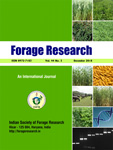K. K. BHARDWAJ*, SATPAL, S. K. SHARMA, VISHAL GOYAL, RAJNI YADAV, PANKAJ, GARIMA DAHIYA AND SONIA DEVI
Department of Soil Science,
Department of Genetics & Plant Breeding (Forage Section),
Krishi Vigyan Kendra, Jhajjar
CCS Haryana Agricultural University, Hisar-125 004 (Haryana), India
*(e-mail: krishansoils@gmail.com)
(Received : 1 August 2023; Accepted : 20 September 2023)
SUMMARY
Among the various benefits of agroforestry system, the most important one is improvement in soil fertility. In addition to this, mitigation of the soil carbon loss by erosion control, nutrient replenishment of the nutrients which are removed by biomass harvest and improving microbial population. There was less effect on soil bulk density but infiltration rate, texture, hydraulic conductivity and other soil physical properties along with soil pH and EC improved in the fodder based agroforestry system as compared to sole crop. The interpretation of the available results showed higher amount for organic carbon, available nutrients than sole cropping at different depths. Different tree based system significantly affected the DTPA extractable micronutrients (Zn, Mn, Cu and Fe) contents in soil. Mineralization increased significantly by incorporating trees with fodder crops. The microbial biomass C and urease activity, dehydrogenase and phosphatase activity increased and the enzymatic activities were found highest under tree with crops as compared to devoid of tree treatment. Hence, it may be concluded that Soil physical, chemical, and biological properties are effectively improved by adopting the fodder based agroforestry practices.
Key words: Fodder based agroforestry system, soil properties, soil fertility

